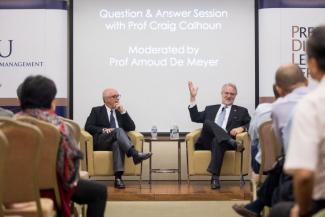
The SMU Presidential Distinguished Lecturer Series (PDLS) ended the year 2015 on a high note with a lecture on 27 November 2015 by its 23rd speaker – Professor Craig Calhoun, a world-renowned social scientist whose work connects sociology to culture, communications, politics, philosophy and economics.
The Director of London School of Economics and Political Science, who has also served for over 10 years as the President of the Social Science Research Council in Brooklyn, attracted a full-capacity audience of more than 100 participants. Comprising not only staff, students and faculty from SMU, but also external academics and corporate members, they came with anticipation to hear him speak on Capitalism, Externalities and Social Institutions.

[Photo: SMU President, Prof Arnoud De Meyer, delivering his welcome remarks at the 23rd Presidential Distinguished Lecture Series event in November 2015.]
The author of several books including Nations Matter, Critical Social Theory, Neither Gods Nor Emperors and most recently The Roots of Radicalism, Prof Calhoun is best known for his work in critical social theory, nationalism, democratic politics, social movements, technological change, as well as the future of capitalism. During the PDLS lecture, he spoke about his theories on the challenges and major threats to capitalism, mitigating the ill-effects of capitalism and how capitalism can change in order to survive and drive global economic integration in a multipolar world.

[Photo: Prof Calhoun speaking on 'Capitalism, Externalities and Social Institutions.']
Prof Calhoun said that while capitalism, an economic system driven by the pursuit of greater capital through the investment of profits, doesn’t guarantee growth, it drives it, pushes it, and depends on it. But he made the argument that business activities also create 'externalities', i.e. costs and benefits to society which are not internalised by the firms.
“Externalities impose costs on consumers of defective or dangerous products; on communities affected by pollution of by-products of production processes; and even on governments through the need for compensatory investments,” he said.
“Some externalities are positive though,” he pointed out. “Businesses can create public goods, such as new shops that revitalise an urban business district and create more foot traffic; or engage in philanthropy, thus distributing some of the profits to society."
Prof Calhoun elaborated on another externality – ‘illth’, a term coined by John Ruskin. “Economics usually doesn’t measure illth very much. There is a movement to try to assess ‘bad stuff’ alongside good, to look at quality-of-life indicators, not just GDP… yet, we measure the productivity of a country in terms of the productivity of the ‘good stuff’ as opposed to ‘good stuff subtracted by bad stuff’,” he said. Some of the ‘bad stuff’, he added, are inevitably produced and in the nature of the pursuit of growth (such as technical unemployment), while some may result from ethical failure.

On the relationship between capitalism and States, he said, “Capitalism has never been just an economic system, it has always been a political-economic system. It has always relied on States to... organise payment for significant costs in the system; and stablise the context of capitalist work, such as social order, national defence and management of international competition and cooperation”. States also provide the conditions for capitalist enterprises, including infrastructure, financial systems and legal systems. More importantly, States, which are distinctively able to provide fairness in sharing the costs of capitalism’s externalities, are crucial in addressing a large variety of negative externalities.
On the transformation of capitalism, Prof Calhoun is of the opinion that its future depends, in part, on better coping with capitalism’s externalities. “Global capitalism is undergoing a transformation. In that transformation, it may be that States need to be playing very strong and active roles if their citizens are to benefit. If that’s a case, developing a strong national identity seems important. Communities still matter… firms also matter, as businesses are also social institutions,” he said.
Within the business world, what are the paths to providing effective social support and compensation for the inevitable externalities of capitalism? “The social responsibility movement points mostly, and most of the time, to ethics and to philanthropy but we need to think through how the actual pursuit of business itself could embrace dealing with the challenges that are posted by negative and inevitable externalities,” he commented.


[Photo: Lively interaction during the Q&A Session.]
As soon as the lecture concluded, the floor was eager to raise their questions to Prof Calhoun. In what was clearly a lively Question-and-Answer session, the diverse questions raised included: the capitalist industry’s involvement in the regional haze problem; the role of tertiary educational institutions in capitalism; and the role of the State in the issuance of money and in fiscal and monetary policies (especially with the emergence of cryptocurrency which may well change the meaning of money).
Participants also asked for Prof Calhoun’s take on the impact of the corporatisation of professions such as accountants and lawyers, which serve as the intellectual backbone of capitalism; how to create national identity without populism, and even Donald Trump’s presidential campaign in the United States.
In closing the event, SMU President Professor Arnoud De Meyer who chaired the session, asked Prof Calhoun if he sees any serious alternative to capitalism, since it requires substantial controls and checks for externalities.
To this, Prof Calhoun said, “Capitalism sort of works. There is no credible alternative. All likely transitions out of capitalism look really bad.” Capitalism will collapse but it may require a long-term transformation. “Efforts to fix and change capitalism seem to me to make a lot more sense," he said.





[Photo: During the Q&A session, Prof Calhoun took diverse questions from the audience, which comprised SMU members and external participants. The lively discussion and interaction continued even after the lecturer had concluded.]
[Featured photo: Prof Craig Calhoun (R) taking questions during a lively Q&A session moderated by Prof Arnoud De Meyer.]